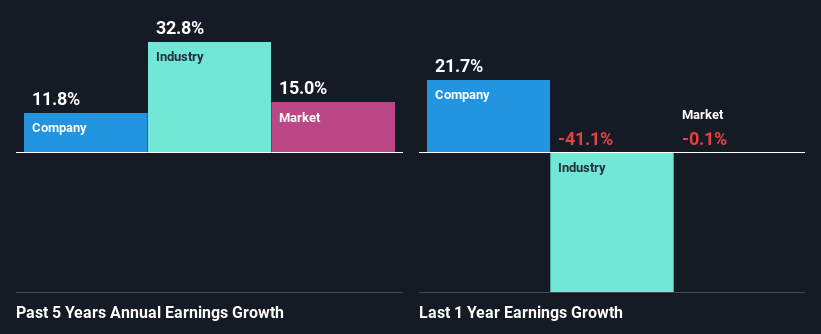Is Horizon Oil Limited's (ASX:HZN) Recent Stock Performance Influenced By Its Fundamentals In Any Way?
Most readers would already be aware that Horizon Oil's (ASX:HZN) stock increased significantly by 16% over the past three months. Given that stock prices are usually aligned with a company's financial performance in the long-term, we decided to study its financial indicators more closely to see if they had a hand to play in the recent price move. In this article, we decided to focus on Horizon Oil's ROE.
Return on equity or ROE is an important factor to be considered by a shareholder because it tells them how effectively their capital is being reinvested. In short, ROE shows the profit each dollar generates with respect to its shareholder investments.
See our latest analysis for Horizon Oil
How Is ROE Calculated?
ROE can be calculated by using the formula:
Return on Equity = Net Profit (from continuing operations) ÷ Shareholders' Equity
So, based on the above formula, the ROE for Horizon Oil is:
47% = US$43m ÷ US$92m (Based on the trailing twelve months to December 2023).
The 'return' refers to a company's earnings over the last year. So, this means that for every A$1 of its shareholder's investments, the company generates a profit of A$0.47.
Why Is ROE Important For Earnings Growth?
Thus far, we have learned that ROE measures how efficiently a company is generating its profits. We now need to evaluate how much profit the company reinvests or "retains" for future growth which then gives us an idea about the growth potential of the company. Assuming all else is equal, companies that have both a higher return on equity and higher profit retention are usually the ones that have a higher growth rate when compared to companies that don't have the same features.
A Side By Side comparison of Horizon Oil's Earnings Growth And 47% ROE
First thing first, we like that Horizon Oil has an impressive ROE. Second, a comparison with the average ROE reported by the industry of 15% also doesn't go unnoticed by us. Probably as a result of this, Horizon Oil was able to see a decent net income growth of 12% over the last five years.
As a next step, we compared Horizon Oil's net income growth with the industry and were disappointed to see that the company's growth is lower than the industry average growth of 33% in the same period.
The basis for attaching value to a company is, to a great extent, tied to its earnings growth. It’s important for an investor to know whether the market has priced in the company's expected earnings growth (or decline). Doing so will help them establish if the stock's future looks promising or ominous. If you're wondering about Horizon Oil's's valuation, check out this gauge of its price-to-earnings ratio, as compared to its industry.
Is Horizon Oil Using Its Retained Earnings Effectively?
The high three-year median payout ratio of 87% (or a retention ratio of 13%) for Horizon Oil suggests that the company's growth wasn't really hampered despite it returning most of its income to its shareholders.
While Horizon Oil has been growing its earnings, it only recently started to pay dividends which likely means that the company decided to impress new and existing shareholders with a dividend.
Summary
In total, it does look like Horizon Oil has some positive aspects to its business. Its earnings have grown respectably as we saw earlier, which was likely due to the company reinvesting its earnings at a pretty high rate of return. However, given the high ROE, we do think that the company is reinvesting a small portion of its profits. This could likely be preventing the company from growing to its full extent. Having said that, the company's earnings growth is expected to slow down, as forecasted in the current analyst estimates. To know more about the company's future earnings growth forecasts take a look at this free report on analyst forecasts for the company to find out more.
Have feedback on this article? Concerned about the content? Get in touch with us directly. Alternatively, email editorial-team (at) simplywallst.com.
This article by Simply Wall St is general in nature. We provide commentary based on historical data and analyst forecasts only using an unbiased methodology and our articles are not intended to be financial advice. It does not constitute a recommendation to buy or sell any stock, and does not take account of your objectives, or your financial situation. We aim to bring you long-term focused analysis driven by fundamental data. Note that our analysis may not factor in the latest price-sensitive company announcements or qualitative material. Simply Wall St has no position in any stocks mentioned.

 Yahoo Finance
Yahoo Finance 
